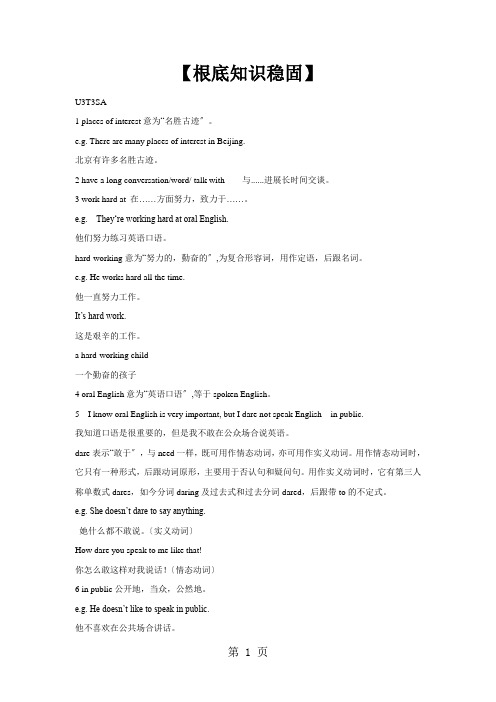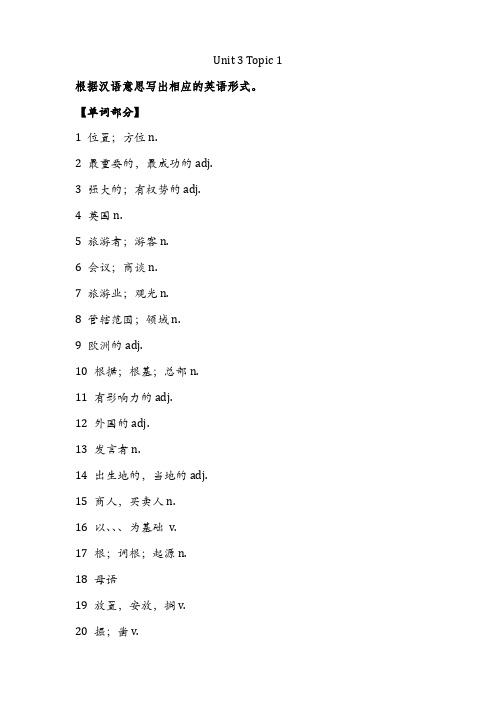仁爱版英语9上Unit3-Topic3复习
- 格式:doc
- 大小:227.00 KB
- 文档页数:6


Unit 3Topic 3Section AThe main activities are 1a and 3. 本课活动是1a和3。
Ⅰ. Teaching aims and demands 教学目标1. Learn some useful words and expressions:dare, sleepy, at times, feel like doing, grammar, copy, diary, keep a diaryI think I should work harder at English.2. Learn the usage of “wh+to do”I don’t know what to do.I don’t know how to say/spell that in English.3. Talk about language learning strategies.Ⅱ. Teaching aids 教具录音机/小黑板Ⅲ. Five-finger Teaching Plan 五指教学方案Step 1 Review 第一步复习(时间:10分钟)1. (检查作业,教师让两名同学复述英式英语和美式英语的发音、拼写和表达方面的不同,巩固上节课所学内容。
)T: I will ask one student to retell us the differences between British English and American English.S1: Let me try. Though written English is very similar between Britain and America. Oral English is quite different. Generally speaking, American English is different from British English in pronunciation, spelling and expression. But people from the two countries do not have much difficulty in understanding each other.T: That’s very great. You know the differences clearly. Now who can tell us how did these differences e about?S2: I know, long ago many British people were forced to leave their country. They brought the English language to other countries, like America, Australia and Canada. So the languagechanged little by little from one part of the world to another and the English language has changed and continues to change.T: Great. You learned a lot. But sometimes a few students want to sleep in my class. In another way of saying, at times a few students feel sleepy.T: Can they study English well?Ss: No.T: Maybe they aren’t interested in English. But I think you can’t give up learning English.T: Why? Because English is very important. Do you know what problems they have?S: Yes, they can’t pronounce English words well.T: Do you know how we can help them? In another way of saying, do you know how to help them?(解释语法结构how + to do sth. 让学生用how+to do造句。

Unit3 Topic3 SectionC 教学设计Ⅰ. Material analysis本课是九年级第三单元第三话题的第三课时。
主活动是1a 和2。
1a 通过小组汇报分享学习英语的经验,老师补充总结,让学生从中获得学习英语的策略。
1b通过填充图表,培养学生获取信息的能力。
1c 是个对话活动,复述1b 里面所提到的各种学习策略。
2 重点在于巩固和运用1a 的重点用语。
3 要求学生学以致用,体现“在做中学”的理念。
学生在学习英语时大都会碰到相似的困难,因而本课对英语学习具有较好的借鉴意义。
本课还可以让学生知道分享学习经验也是一种快乐。
3 作为写作训练,需要学生整合所学知识,留作家庭作业,以便学生有充足的时间去完成。
Ⅱ. Teaching aims1. Knowledge aims:掌握本课的重点词汇和短语,继续学习“how / what ...+ to do sth.”。
2. Skill aims:继续运用构词法来猜测本课新词的含义,读出新词的发音。
学习运用scanning,来迅速找到所需要的信息。
3. Emotional aims: (optional)鼓励学生在学习英语时,要学会求助,学会分享。
4. Culture awareness: (optional)在学习英语时不能逐字逐句地翻译,要尽可能地按照英语的思维去理解句子,即要掌握特定的习语。
Ⅲ. The key points and difficult points1. Key points:Words and phrases: review, preview, translate, discussion, exactly, honor, achieve, aslong as, stick to (doing) sth., share...with ...., prefer doing sth.,advise sb.to do sth., agree with sb, as ...as possible, have(no)chance to do sth., practice doing sth.Sentences: I’m very glad to share our group’s opinions with you.It’s an honor to talk with all of you here.I’m sure that you’ll make great progress as long as you stick to them.1Thank you for listening!Grammar: how/what... + to do sth.2. Difficult points:在任务3 中,能够根据李明的“症状”,有针对性地“下药”。


【根底知识稳固】U3T3SA1 places of interest意为“名胜古迹〞。
e.g. There are many places of interest in Beijing.北京有许多名胜古迹。
2 have a long conversation/word/ talk with 与......进展长时间交谈。
3 work hard at 在……方面努力,致力于……。
e.g. They‘re working hard at oral English.他们努力练习英语口语。
hard-working意为“努力的,勤奋的〞,为复合形容词,用作定语,后跟名词。
e.g. He works hard all the time.他一直努力工作。
It’s hard work.这是艰辛的工作。
a hard-working child一个勤奋的孩子4 oral English意为“英语口语〞,等于spoken English。
5 I know oral English is very important, but I dare not speak English in public.我知道口语是很重要的,但是我不敢在公众场合说英语。
dare表示“敢于〞,与need一样,既可用作情态动词,亦可用作实义动词。
用作情态动词时,它只有一种形式,后跟动词原形,主要用于否认句和疑问句。
用作实义动词时,它有第三人称单数式dares,如今分词daring及过去式和过去分词dared,后跟带to的不定式。
e.g. She doesn’t dare to say anything.她什么都不敢说。
〔实义动词〕How dare you speak to me like that!你怎么敢这样对我说话!〔情态动词〕6 in public公开地,当众,公然地。
e.g. He doesn’t like to speak in public.他不喜欢在公共场合讲话。

Unit 3 Topic 1根据汉语意思写出相应的英语形式。
【单词部分】1 位置;方位n.2 最重要的,最成功的adj.3 强大的;有权势的adj.4 英国n.5 旅游者;游客n.6 会议;商谈n.7 旅游业;观光n.8 管辖范围;领域n.9 欧洲的adj.10 根据;根基;总部n.11 有影响力的adj.12 外国的adj.13 发言者n.14 出生地的,当地的adj.15 商人,买卖人n.16 以、、、为基础v.17 根;词根;起源n.18 母语19 放置,安放,搁v.20 掘;凿v.21 分,划分v.22 双胞胎之一的n.23 不可能的adj.24 解释;说明v.25 口译译员n.26 沟通,交流v.27 西班牙语n.28 在今晚adv.29 车库n.30 电影制作人31 外国人n.32 遍及;贯穿prep.33 普通地;广泛地adv.34 人物;汉字;品格n.35 漫画n.【短语部分】36 把、、、分成、、、37 与、、、相似38 出差39 对、、、感到高兴40 从今往后41 坚持做某事42 为、、、做准备43 准备做、、、44 迫不及待做某事45 有机会做某事46 练习做、、、47 从那时起48 从今天起49 等着瞧50 等待51 别担心52 迫不及待要某事物53 停业,歇业54 官方语言55 如果有必要56 摆脱困境57 自寻烦恼58 在困境中59 给某人惹麻烦60 说明,解释61 在所有、、、中62 除、、、之外;与、、、一样63 国际贸易64 显而易见65 去国外66 在、、、中起着重要作用67 在国际会议上68 在、、、方面处于领先地位69 结果70 受到、、、欢迎71 鼓励某人做某事72 在某方面取得巨大进步73 要求某人做某事74 把、、、当作、、、【重点句子】75 世界上数以百万计的人都喜欢迪士尼乐园。
76 英语在美国被当作主要语言使用。
77 现在,英语是使用最广泛地国际语言。
Unit 3 Topic 1 Section A短语1. stick sth. on the wall 把某物粘在墙上stick to sth. / doing sth 坚持做某事2. cartoon characters 卡通人物3. one day (将来/ 过去)某一天4. can’t wait to do sth 迫不及待做某事5. have a good chance to do sth有做某事的好机会have no chance to do sth 没有激活做6.throughout the world= all over the world 全世界7. try/do one’s best 尽某人最大的努力try to do sth 努力做某事try doing sth 试着做某事8. from now on 从现在起,从今往后9. be pleased with 对……高兴/ 满意句子1.Disneyland is enjoyed by millions of people from all over the world.迪士尼乐园受到全世界数百万人的喜欢2.Are you ready for your trip?你为你的旅行做好准备了吗?3.I can’t wait to fly there. 我等不及要飞到那去了。
4.You’ll have a good chance to practice English there. 你在那儿将有一个练习英语的好机会。
5.English is spoken as the main language in America.英语在美国被当做主要语言使用。
6.It is also widely used throughout the world now. 它现在在全世界也被广泛使用。
7.Try you best and work much harder from now on.尽你最大努力,从现在开始更加努力学习。
1.现在完成时的用法:表示过去某一时间发生的动作或存在的状态,对现在仍有影响。
e.g. I have just posted the letter. 我刚把信邮寄了。
She has lost her watch. 她弄丢了手表。
2.现在完成时可以和不明确指出时间的状语连用,如already, yet,just,before, ever, lately, once等。
e.g. Have you heard from your friend lately?你最近收到你朋友的来信了吗?3.现在完成时也可以和包括现在在内的时间状语连用。
如this week, thismorning, today, thisyear等。
e.g. They have moved three times this year. 今年他们已经搬了三次家。
4.现在完成时不能和明确表示过去时间的状语连用。
如yesterday, last week, in 1999, two days ago,just now, when I came in等。
Unit 1-topic3现在完成时(Ⅲ)1.现在完成时表示从过去某一时刻延续到现在的动作或状态,常与for,since引导的状语连用。
for+一段时间,since+过去时间点或从句(从句的谓语动词用过去式)。
e.g. I have lived here for twenty years.我住在这里已有20年了。
We have built many factories since 1985.自1985年以来,我们建了许多工厂。
He has always helped me with my English since he came here.自从他到这里以后,他总是帮助我学习英语。
2.有的动词所表示的动作不是瞬间就可以完成的,要持续一段时间,这样的动词叫延续性动词。
不能延续下去的动词,叫非延续性动词或瞬间动词。
Unit 3 Topic 3(复习)1 I dare not speak English in public.dare 1)情态动词“敢于”常用于否定句和疑问句--- 否定形式:dare not ;疑问形式:Dare 提到主语前2)实义动词“敢于”用于各种句式--- dare to do sth., 有动词的各种形式。
三单______现分____ 注意:dare通常不用于肯定句,除了I dare (to) say… (我敢说…)练习:a. I dare not tell him the truth. 译:___________ ______动词b. How dare you say that? 译:_____________________ ______动词d. He doesn’t dare to say anything. 译:________________ ______动词2. And I always feel sleepy in English classes .译:___________________________思考:sleepy_________ (词性) __________ (词意)链接:sleep (动词意)_______; (名词意)_________; asleep (词性)_________ (词意) _________;sleepless失眠的,睡不着的; sleeper卧车;轨枕;睡觉(呈某种状态)的人对比:asleep与sleepy:1)均为形容词,都可以作表语--- fall asleep 入睡;be asleep 睡着的;feel sleepy 昏昏欲睡;be sleepy要睡的2)但sleepy 除作表语外,还可作定语修饰名词,而asleep不能作定语--- a sleepy student 一个困倦的学生练习:1.温暖的阳光使他昏昏欲睡。
The warm sunshine ________ ________ _______ ________.2.昨天他太累了结果在课堂上睡着了。
He was _____ _______ ______ he was ________ ___ yesterday.3.I’ve worked hard at it for a whole week, but it seems that I haven’t made any progress.译:___点拨: work hard at sth. 努力学习…链接:hard work---____________; hard-working---____________(复合形容词,作定语)练习:a.他正在攻读英语。
He is _________ ________ ______ English.b.那是项艰苦的工作,所以我们应该努力干。
That’s a piece of ______ _______, so we should ______ ______.c.他们俩都是勤奋的学生。
They_______ ________ ___________ _________.点拨: It seems that + 从句= sb. / sth. seems to do sth. …似乎,好像…练习: a.It seemed that she was sad yesterday. --- 同义句:______________________b.他好像生我的气了。
1)_____________________________ 2)_____________________4.I don’t know what to do. 译:____点拨: what to do是“疑问词+不定式”结构,在句中作___语链接:疑问词+不定式结构在句中还可以作主语,宾语,表语等。
不定式和疑问词who, what, which, when, how, where, (why除外)及whether 等连用,构成不定式短语。
1. I don’t know _______ _______ _______(如何记) new words.2. Could you tell me _________ ______ ________(哪里找) a good pen pal ?3. _________ ______ ________(是否离开) is the biggest problem.4. Our duty is _______ _____ _______(如何解决) the population problem.5. They haven’t decided ________ _____ ______(去哪里).练习:1.When to start hasn’t been decided. 译:_________________ 作____ 语2. The question is where to get enough money. 译:________________作____ 语5 Could you give us some advice on how to learn English well? 译:_________ 作____ 语此结构有时可以转化成宾语从句。
如:I don’t know what to do.= I don’t know what I should do. Could you give us some advice on how to learn English well?=how___ ______ _____ English well.练1.I can’t decide where I shall find a pen pal. = I can’t decide ________ ____ _______ a pen pal.2. She didn’t know what she would say. = She didn’t know ________ ______ _______.3. I don’t know how I can get to the park.= I don’t know _______ _____ _______ _____the park.4. She doesn’t know which skirt she will choose.She doesn’t know _______ _______ ______ _______.1. He didn’t know where to find his father. (同义句)He didn’t know __________ his father. 6. At times I feel like giving up. 译:________________________________点拨:at times = sometimes---有时拓展:sometime---________all the time---________in time---__________ on time___________ some time____________feel like doing sth. --- 想要做某事同义表达法:want ___ _____ sth. ; would like___ _____ sth. give up --- 放弃(动词+副词结构)用法:give sth.up---放弃某事give up doing sth.--- 放弃做某事接:动词+ 副词结构的词组还有:Pick up_________ look up_______ turn up_______ eat up_____ cut up______ wake up_____try on__________ put on ________ take off_______ turn off_____ take away______ put away_____ turn down_______ work out________ put out________ cut down_______练习:a.你想吃点东西吗?1)_______________________________2)_______________________________ 3)_____________________________b.放弃吧,他绝不会同意你的。
Give ____ up. He’ll never _______ ______ _______7.Could you give us some advice on how to learn English well? 译:______________________点拨:give sb. some advice on/about…给某人一些有关……的建议练习:你能给我一些怎样使用电脑的建议吗?Can you _____ ___ _____ ________ ___ _____ ___ use a computer? 链接:听从/采纳某人的建议---___________________________;一个好的建议---_________________________建议某人做某事____________________8.Two years ago, I was also weak in English. 译:_________________点拨:be weak in --- 不擅长;在…方面薄弱练习:我总是学不好理科。
I _______ always _________ _____ the science subject.链接:weak ---(身体)虚弱的,无力的9. I dare not answer questions in class, because I’m afraid of making mistakes.译:_______点拨:be afraid of sth./doing sth.--- 害怕某事/做某事…链接:be afraid to do sth. --- (因害怕)不敢去做某事点拨: mistake---错误(名词) --- make mistakes --- 犯错误拓展:mistake --- 犯错误(动词)----- (过去式/分词) __________ __________链接:by mistake --- 错误地,无意地--- do sth. by mistake______________;mistake A for B----错把…当作…,把…误认为...练习: a.对不起,我无意中打开了你的一封信。